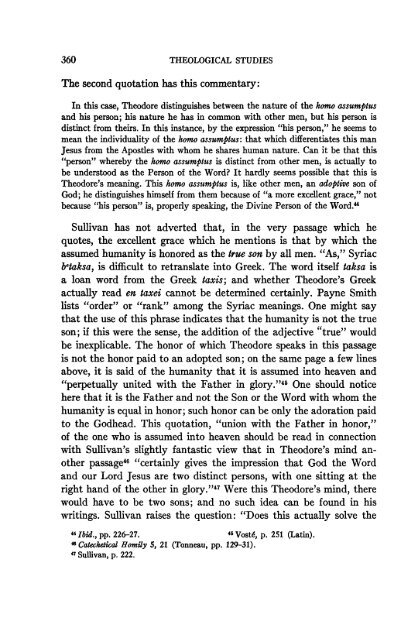ANNOTATIONS ON THE CHRISTOLOGY OF THEODORE OF ...
ANNOTATIONS ON THE CHRISTOLOGY OF THEODORE OF ...
ANNOTATIONS ON THE CHRISTOLOGY OF THEODORE OF ...
You also want an ePaper? Increase the reach of your titles
YUMPU automatically turns print PDFs into web optimized ePapers that Google loves.
360 <strong>THE</strong>OLOGICAL STUDIES<br />
The second quotation has this commentary:<br />
In this case, Theodore distinguishes between the nature of the homo assumptus<br />
and his person; his nature he has in common with other men, but his person is<br />
distinct from theirs. In this instance, by the expression "his person," he seems to<br />
mean the individuality of the homo assumptus: that which differentiates this man<br />
Jesus from the Apostles with whom he shares human nature. Can it be that this<br />
"person" whereby the homo assumptus is distinct from other men, is actually to<br />
be understood as the Person of the Word? It hardly seems possible that this is<br />
Theodore's meaning. This homo assumptus is, like other men, an adoptive son of<br />
God; he distinguishes himself from them because of "a more excellent grace," not<br />
because "his person" is, properly speaking, the Divine Person of the Word. 44<br />
Sullivan has not adverted that, in the very passage which he<br />
quotes, the excellent grace which he mentions is that by which the<br />
assumed humanity is honored as the true son by all men. "As," Syriac<br />
b e taksa, is difficult to retranslate into Greek. The word itself taksa is<br />
a loan word from the Greek taxis; and whether Theodore's Greek<br />
actually read en taxei cannot be determined certainly. Payne Smith<br />
lists "order" or "rank" among the Syriac meanings. One might say<br />
that the use of this phrase indicates that the humanity is not the true<br />
son; if this were the sense, the addition of the adjective "true" would<br />
be inexplicable. The honor of which Theodore speaks in this passage<br />
is not the honor paid to an adopted son; on the same page a few lines<br />
above, it is said of the humanity that it is assumed into heaven and<br />
"perpetually united with the Father in glory." 45 One should notice<br />
here that it is the Father and not the Son or the Word with whom the<br />
humanity is equal in honor; such honor can be only the adoration paid<br />
to the Godhead. This quotation, "union with the Father in honor,"<br />
of the one who is assumed into heaven should be read in connection<br />
with Sullivan's slightly fantastic view that in Theodore's mind another<br />
passage 46 "certainly gives the impression that God the Word<br />
and our Lord Jesus are two distinct persons, with one sitting at the<br />
right hand of the other in glory." 47 Were this Theodore's mind, there<br />
would have to be two sons; and no such idea can be found in his<br />
writings. Sullivan raises the question: "Does this actually solve the<br />
44 Ibid., pp. 226-27. « Vost£, p. 251 (Latin).<br />
46 Catechetical Homily 5, 21 (Tonneau, pp. 129-31).<br />
47 Sullivan, p. 222.
















